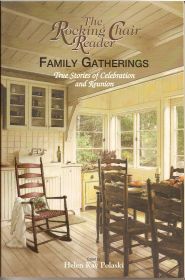
“Aren’t you gonna swim, Grandp—Pawpaw?”
The name filled my mouth like the giant buttery biscuits my grandmother baked for breakfast—not at all unpleasant, just different. After all, I was a seven-year-old Yankee from “up north,” unaccustomed to addressing grandparents as “Pawpaw” and “Mammy,” the accepted titles of love and respect that came so easily to my cousins.
Pawpaw’s eyes twinkled as he sat on the orange clay bank, and he thrust his jaw forward in a smile that reminded me of a friendly bulldog. “No, honey,” he rumbled in his deep bass voice, “ya’ll swim, and I’ll just watch.” Sweat poured down his face; no wonder! Dressed in his usual heavy gray pants and long-sleeved shirt, he made me feel hot.
I paddled away to join my siblings and cousins in the clear, cold ecstasy of Dixie Pool, a round mirror-like spring. My father’s family gathered to swim there during our annual visits to Eros, a sleepy little town in the northern Louisiana pine woods. When the summer heat and humidity lay on us all like a smothering quilt, we sat for hours on the screened porch while my father and his sisters told endless stories from their childhood, or we headed for Dixie Pool. It goes without saying which I liked best.
My father and uncles yelled and swung across the spring on a rope like Tarzan in the movies. My older brother did “cannonballs” off the bank and walked on his hands underwater. My cousins and I played “Motorboat” with the little ones, whirling them around in ring-around-the-rosy circles until we all fell down amidst a chorus of laughter, cries and gurgles:
Motorboat, motorboat, go so slow!
Motorboat, motorboat, go so fast!
Motorboat, motorboat, step on the gas
Our mothers, wading at the spring’s edge like pretty herons, objected to our drowning our younger siblings. So we left the toddlers to play “Tea and Crackers” underwater, tipping imaginary teapots into pretend cups, “eating” from each others’ invisible plates, wiping our lips daintily before rising to the surface. We swam races (which I always lost) and dove for smooth red pebbles we treasured like rubies. Sometimes we clung to round watermelons from Pawpaw’s patch as we swam. They kept us afloat, and later doubled as a sweet, chilly snack.
I liked Dixie Pool better than any lake at home. The bottom was firm, as if it had been designed for our swimming party, not squishy and obscene with mysterious goo and unnamed life forms.
All the while, Pawpaw sat alone, his worn, leathery hands folded, watching us frolic like dolphins. Occasionally he donned his gold-rimmed glasses to read from a plain little black Book. I decided then and there never to get old. Old people never had any fun. I lay on my back, trying to float as my swimming instructor, Miss Angie, taught me. Suddenly a huge WHUMPF! sounded behind me. A wave of cold water swept over my face, and I dropped like a rock to the bottom. Choking and sputtering, I crawled to my feet, poised to bawl like an indignant calf. If I cried loud enough, surely my brother would suffer dire consequences for doing a cannonball too close.
Instead, Pawpaw emerged from Dixie Pool, water streaming from his hair, his face shining, his eyes sparkling with triumph! Fully dressed, he had flipped off the bank in a dive that surpassed the best show-off in the group. Pawpaw’s adult children stood speechless, jaws slack with unbelief. His grandchildren slapped their wet hands together like baby seals and shouted their adulation.
Within 24 hours, all Eros knew their town patriarch, the devout biblical scholar with the sixth-grade education, had scored a 10 that put Olympic dives to shame.
Forty-five years later, I remember Pawpaw and Dixie Pool—and leave my safe, comfortable spot on the bank to do a few flips of my own.
Copyright
2006 Rachael Phillips
